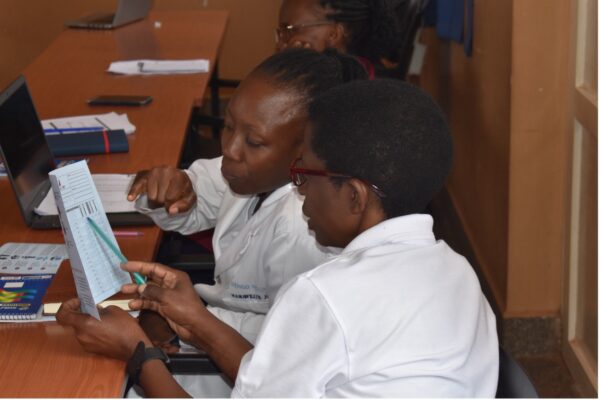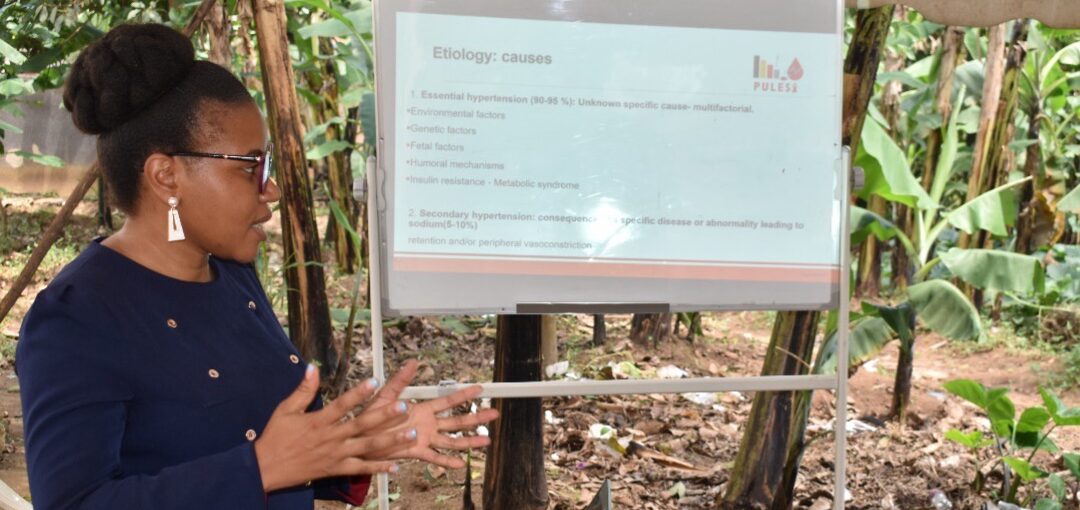A study nurse facilitates a training on hypertension care at Kakiri HCIII, a peri-urban clinic in Wakiso District, Uganda. (PHOTO: PULESA/Chelsea Lipoto)
Written by Asiimwe Masika Jacqueline, Research Assistant, PULESA Uganda.
The PULESA study, HLB-SIMPLe’s project working to improve blood pressure metrics among people living with HIV (PLWH) in urban and peri-urban Uganda, recently entered their final stage of implementation.
The research team is evaluating two different strategies for integrating hypertension services into HIV clinics (called “HTN-basic” and “HTN-plus”) in Kampala and Wakiso districts. The intervention rollout is being conducted in phases, following a stepped wedge study design. With this type of study, interventions are rolled out to participants – or, in the case of PULESA, health facilities – over time, collecting data from the various sites before, during, and after the intervention period. By the end of the study, all 16 participating facilities will have received the intervention. These designs are common in implementation science studies, where interventions incorporate evidence-based practices that are known to work well, so it is undesirable and unethical to withhold them from anyone.
During implementation, study sites receive blood pressure machines and antihypertensive medications, while the PULESA team trains health providers at the facilities to screen for and manage hypertension in patients. Health care providers, clinic managers, people living with HIV and hypertension, and policymakers are kept informed and engaged throughout this time. Additionally, because the charts and tools routinely used in these clinics are not adequately capturing all key hypertension parameters necessary for tracking progress, PULESA is working with administrators to improve data collection systems.
PULESA researchers rolled out their intervention at the first two clinics (Butabika and Nurture Africa) in March 2023 and added two more clinics every two months according to the randomized schedule developed at the beginning of the study. In May 2024, the last two clinics (Kakiri Health Center and Mengo Hospital) began implementing the PULESA interventions.

Health care providers at the Mengo Hospital HIV clinic in Uganda participated in a training on hypertension facilitated by the PULESA team. (PHOTO: Courtesy of PULESA).
Over the past 15 months, the team has made some noteable observations:
- Hypertension rates are high among PLWH, yet patients rarely know that they are affected. Most understand little about the condition, its risks, and how to treat it.
- Patients who visited PULESA intervention facilities appreciate having access to integrated HIV and hypertension services, as it allows them to make fewer trips to clinics, which savies them time and money.
- Most patients with hypertension follow the recommendations given by their health providers, taking medication as indicated, but some do not. The study team is working with the clinics to improve provider/client communication and follow-up to ensure all patients are following the recommended treatment to manage their hypertension.
Preliminary findings indicate that integrating HIV and hypertension services health facilities can reduce costs for patients and health providers while improving care and, ultimately, saving lives. The PULESA research team is hoping that the results of this study will provide valuable information allowing Uganda and other low- and middle-income countries to reduce morbidity and mortality associated with hypertension and cardiovascular disease among people living with HIV.
A note to PULESA’s stakeholders and supporters: Your partnership has been a catalyst for growth and progress in the study. We couldn’t have made it this far without you. Thank you!
HLB-SIMPLe is funded by the Center for Translation Research and Implementation Science at the National Heart, Lung, and Blood Institute (NHLBI) and the Fogarty International Center at the US National Institutes of Health (NIH). The PULESA Uganda grant is UH3-HL-154501, and the RCC grant (which funds this website) is U24-HL-154426.

